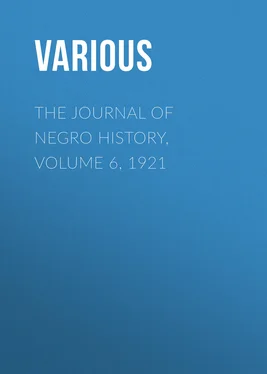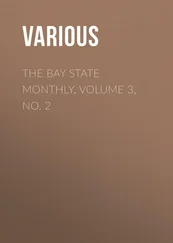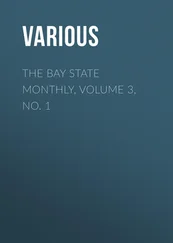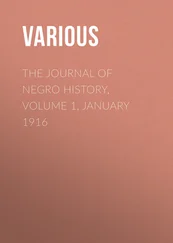Various - The Journal of Negro History, Volume 6, 1921
Здесь есть возможность читать онлайн «Various - The Journal of Negro History, Volume 6, 1921» — ознакомительный отрывок электронной книги совершенно бесплатно, а после прочтения отрывка купить полную версию. В некоторых случаях можно слушать аудио, скачать через торрент в формате fb2 и присутствует краткое содержание. Жанр: foreign_antique, periodic, История, foreign_edu, на английском языке. Описание произведения, (предисловие) а так же отзывы посетителей доступны на портале библиотеки ЛибКат.
- Название:The Journal of Negro History, Volume 6, 1921
- Автор:
- Жанр:
- Год:неизвестен
- ISBN:нет данных
- Рейтинг книги:4 / 5. Голосов: 1
-
Избранное:Добавить в избранное
- Отзывы:
-
Ваша оценка:
- 80
- 1
- 2
- 3
- 4
- 5
The Journal of Negro History, Volume 6, 1921: краткое содержание, описание и аннотация
Предлагаем к чтению аннотацию, описание, краткое содержание или предисловие (зависит от того, что написал сам автор книги «The Journal of Negro History, Volume 6, 1921»). Если вы не нашли необходимую информацию о книге — напишите в комментариях, мы постараемся отыскать её.
The Journal of Negro History, Volume 6, 1921 — читать онлайн ознакомительный отрывок
Ниже представлен текст книги, разбитый по страницам. Система сохранения места последней прочитанной страницы, позволяет с удобством читать онлайн бесплатно книгу «The Journal of Negro History, Volume 6, 1921», без необходимости каждый раз заново искать на чём Вы остановились. Поставьте закладку, и сможете в любой момент перейти на страницу, на которой закончили чтение.
Интервал:
Закладка:
Suffrage
As already mentioned above the Negroes during this period were struggling to retain the right of suffrage and, of course, were attacking in the courts those restrictions primarily directed toward the elimination of the Negroes from the electorate. The Supreme Court of the United States generally shrank from these cases by disclaiming jurisdiction. In Ex Parte Siebold , 60 60 100 U. S., 371.
Ex Parte Yarborough , 61 61 110 U. S., 651.
and In re Coy , 62 62 127 U. S., 731.
however, the general jurisdiction of Federal courts over matters involved in the election of national officers was affirmed. The court held that it had jurisdiction in the election case in Wiley v. Sinkler , 63 63 179 U. S., 58.
when there was brought an action to recover damages of an election board for wilfully rejecting a citizen's vote for a member of the House of Representatives. In Swafford v. Templeton 64 64 185 U. S.
a suit was brought for damages for the alleged wrongful refusal by the defendants at an election of officers to permit the plaintiff to vote at a national election for a member of the House of Representatives. It was held that the court had jurisdiction.
From the Supreme Court of the United States, however, the Negroes received little encouragement, in as much as the right of suffrage, with its requirements of property ownership and the literacy test, could be withheld from the Negro without specifically discriminating against any one on account of race or color. In Southy v. Virginia , 181 U. S., Revised Statutes, of the United States, Cont. St. 1901, pages 37-42, providing that every person who prevents, hinders, controls or intimidates another from exercising the right of suffrage, to whom that right is guaranteed by the Fifteenth Amendment of the Constitution of the United States, by means of bribery, etc., shall be punished, was held invalid as it was considered to be beyond the constitutional power of Congress to act in such a case except in that of race discrimination. If the discrimination is in a State or municipal election, however, Congress may intervene, if the discrimination is shown, but not until then.
In the case of Giles v. Harris 65 65 189 U. S., 475.
there was brought to the Supreme Court a bill in equity, complaining that Negroes qualified to vote for members of Congress had been refused on account of their color by virtue of the Alabama constitution, whereas white men were registered to vote at such an election. Relief was asked for on the basis of the Revised Statutes, Sec. 1979, praying that the Supreme Court should order that the petitioner be registered and declare null and void the special clause of the Alabama constitution. The court answered this petition with certain observations disclaiming jurisdiction largely for "want of merit in the averments which were made in the complaint as to the violation of Federal rights."
The court held that if the registrars acting at this election in Alabama had no authority under the new constitution, which the petitioner prayed that the court might declare null and void, they could not legally register the plaintiff. If they had authority, they were within their right to use their discretion. If this clause in the constitution should be struck down according to the prayer of the plaintiff, there would be no board to which the mandamus could be issued. The Supreme Court, therefore, held that no damage had been suffered because no refusal to register by a board constituted in defiance of the Federal Constitution could disqualify a legal voter otherwise entitled to exercising the electorate franchise, since this amounts to a decision upon an independent non-Federal ground sufficient to sustain the judgment without reference to the Federal question presented. It observed, moreover, that the bill imported that the great mass of the white population intended to keep the blacks from voting. To meet such an intent something more than ordering the plaintiff named to be inscribed upon the lists of 1902 would be needed.
Giving his dissenting opinion in this case, Justice Brewer showed that "although the statute and these decisions thus expressly limit the range of inquiry to the question of jurisdiction, it was held that there is a constitutional question shown in the pleadings. The certificate, therefore, might be ignored and the entire case presented to the court for consideration.... Hence every case coming up on a certificate of jurisdiction may be held to present a constitutional question and be open for full inquiry in respect to all matters involved." Brewer would not assent to the proposition that the case presented was not a strictly legal one and entitling a party to a judicial hearing and decision. "He is a citizen of Alabama entitled to vote. He wanted to vote at an election for a Representative in Congress. Without registration he could not, and registration was wrongfully denied him. That many others were thus treated does not deprive him of his right or deprive him of relief." Justice Harlan dissented also giving practically the same argument as that of Justice Brewer. He observed: "The court in effect says that although it may know that the record fails to show a case within the original cognizance of the Circuit Court, it may close its eyes to that fact, and review the case on its merit." In view of the adjudged cases, he could not agree that the failure of parties to raise a question of jurisdiction relieved this court of its duty to raise it upon its own motion.
There was thereafter presented a petition for modification of judgment and for a rehearing June 1, 1903. The court ordered the decree of affirmance changed adding these words: "So far as such decree orders that the petition be dismissed, but without prejudice to such further proceedings as the petitioner may be advised to make."
The case of Giles v. Teasley 66 66 193 U. S., 146.
was, to some extent, of the same sort. A Negro of Alabama who had previously been a voter and who had complied with the reasonable requirements of the board of registration, was refused the right to vote, for, as he alleged, no reason other than his race and color, the members of the board having been appointed and having acted under the provision of the State constitution of 1901. He sued the members of the board for damages and for such refusal in an action, and applied for a writ of mandamus to compel them to register him, alleging in both proceedings the denial of his rights under the Federal Constitution and that the provisions of the State Constitution were repugnant to the Fifteenth Amendment. The complaint had been dismissed on demurrer and the writ refused, the highest court of the State holding that if the provisions of the constitution were repugnant to the Fifteenth Amendment, they were void and that the board of registers appointed thereunder had no existence and no power to act and would not be liable for a refusal to register him, and could not be compelled by writ of mandamus to do so; that if the provisions were constitutional, the registrars had acted properly thereunder and their action was not reviewable by the courts.
"The right of the Supreme Court to review the decisions of the highest court of a State," said the national tribunal, "is even in cases involving the violations by the provisions of a State constitution of the Fifteenth Amendment, circumscribed by rules established by law, and in every case coming to the court on writ of error or appeal the question of jurisdiction must be answered whether propounded by the counsel or not. Where the State court decided the case for reasons independent of the Federal right claimed its action is not reviewable on writ of error by the United States Supreme Court." It was held that the writs of error to this court should be dismissed, as such decisions do not involve the adjudication against the plaintiff in error of a right claimed under the Federal Constitution but deny the relief demanded on grounds wholly independent thereof." In Wiley v. Sinkler , and Swafford v. Templeton , the registrars were legally averred to be qualified. 67 67 The Constitution of Mississippi prescribing the qualifications for electors conferred upon the legislature the power to enact laws to carry those provisions into effect. Ability to read any section of the Constitution or to understand it when read was made a qualification necessary to a legal voter. Another provision made the qualifications for grand or petit jurors that they should be able to read and write. Upon the complaint of Negroes thus disabled the court held that these provisions do not on their face discriminate between white and Negro races and do not amount to a denial of the equal protection of the law secured by the Fourteenth Amendment of the Constitution. It had not been shown that their actual administration was evil, but that only evil was possible under them. In Washington County, Mississippi, Williams had been indicted for murder by a grand jury composed of white men altogether. He moved that the indictment be quashed because the law by which the grand jury was established was unconstitutional. ( Williams v. Mississippi. )
Интервал:
Закладка:
Похожие книги на «The Journal of Negro History, Volume 6, 1921»
Представляем Вашему вниманию похожие книги на «The Journal of Negro History, Volume 6, 1921» списком для выбора. Мы отобрали схожую по названию и смыслу литературу в надежде предоставить читателям больше вариантов отыскать новые, интересные, ещё непрочитанные произведения.
Обсуждение, отзывы о книге «The Journal of Negro History, Volume 6, 1921» и просто собственные мнения читателей. Оставьте ваши комментарии, напишите, что Вы думаете о произведении, его смысле или главных героях. Укажите что конкретно понравилось, а что нет, и почему Вы так считаете.












